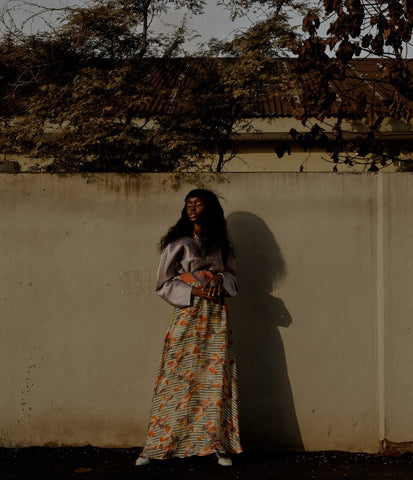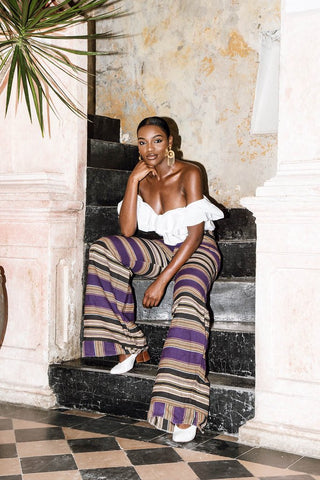Asiyami “Gold” Wekulom is more than just a muse. The millennial art director’s Instagram page functions as a virtual mood board, with colorful snapshots of dream destinations, positive mantras and rich, international cuisines. Often, you’ll catch her modeling designs from her clothing line, A.Au, in front of backdrops the shades of Pantone palettes, serving endless inspiration to more than 100,000 followers who think of her as a sister. What they may miss, though, are the shards of life-altering experiences that inspire her artful eye.Wekulom is standing in the Zara flagship store in SoHo, browsing a rack of potential pulls for a Harper’s Bazaar photo shoot the next morning. Seeing her arms filled with clothing, I flash back to Lenox Square Mall in Atlanta, where Wekulom and I worked together at Urban Outfitters years ago. After closing shifts, I would watch her purchase seemingly unflattering pieces she’d later transform into singular jaw-dropping ensembles. Her ability to curate beauty was, and still is, her magic. When Wekulom invites me to a girls’ night at her friend Simi’s apartment the gathering morphs into a wig-making class with Wekulom as the instructor. The night isn’t so much about hair as it is unfiltered sisterhood, allowing a safe space for her to share the depth of how her upbringing influenced her visual storytelling.
Born in Port Harcourt, Nigeria, Wekulom grew up the second of four children. At age 11, she moved to America with her family, following the death of her little sister, Winner, who succumbed to sickle cell disease at 5 years old. “Hearing that [she passed] was awful. And then the day after, we had to move,” she remembers. Amid the burden of leaving Nigeria, the family withstood a financial strain after her father lost his job and used their $30,000 life savings for a visa lottery. Following a brief pit stop in Atlanta, the family settled in Peoria, Illinois; it was a drastic cultural shift. “I was the only black kid in my school, which was a crazy transition,” says Wekulom. “My dad got to the point where he couldn’t afford to buy us clothes. People in our school would look at me like, ‘Damn, this girl wears the same clothes every day.’

At a young age, Wekulom leaned on faith as she braved life’s unkindness. “Spirituality is a huge thing in Africa,” she says. “You can go home and not have money, but still feel like the richest person in the world. That inner spiritual wealth is important.” Ten years later, she is financially independent as her fashion business flourishes. Wekulom remained in America when her father returned to Nigeria, but she maintains her African culture. It is evident even in the way she blends audacious prints with a minimalistic sophistication in her design work. “I want to inspire people to be a part of my culture, because my culture is a huge part of me,” she says. “It’s embedded in my being.”Pride in her culture caused Wekulom to hone in on the glaring absence of black girls in the style bloggers’ space. Coupled with her love for beauty and fashion, it drove her to carve out a space of her own. “When I created my blog, I saw all of these white girls killing it,” the creative recalls. “But you stop and think, ‘Where the fuck is the black girl?’” She decided to take her craft a step further. “I wanted to tell a story. Photography is supposed to move people in the same way that music moves people, so I wanted to create a platform that made people ask themselves questions. If there’s anything that my platform can inspire anyone to do, it would be to live your best life.”
Wekulom witnessed the reach of her influence once while in France during a sit-down with one of her young followers who had traveled 45 minutes by train to see her. “I made it a priority to not wear any makeup,” she says of the meet-and-greet. “You could just see that she was happy to see a black woman out there who is relatable. While we were talking, I was thinking, Man, I can’t believe living my truth would inspire someone else to want to live their life. She looked at me and she didn’t see a Beyoncé, she saw a human being. That’s what made her feel like she was able to call me her sister.”

In another kind-hearted act, last year, Asiyami made a wig from scratch for a woman battling breast cancer. “When a disease kicks in, you forget about self-care and what it means to be a woman,” she explains. “We possess so many powerful things and we lose all of them [to breast cancer]. Your dignity, your self-esteem. Wigs allow you to feel ‘yourself.’ I wanted to give someone the opportunity to feel whole again.”
Wekulom blesses us with another mantra as Trader Joe’s wine and vulnerabilities flow within our impromptu sister circle. “As long as you know that you’re going to be successful in life, you don’t have to be ashamed about where you are. That’s why I always say the glo’ up is gonna be so real, because there’s so many people who have given up on me. Who didn’t believe in me, and said my life is stagnant,” Wekulom says of the people she has obviously proven wrong.

I walk away from our heart-filled session with an unfinished U-part wig, but I’m awash with hope and happiness. Wekulom’s message is clear: she doesn’t simply do it for the ’gram. An alternative to the oversaturation of selfies and tummy teas, her Instagram is a conscious effort to help people nourish their souls and get in tune with the world. Her story is a powerful reminder that hardships and pressure create diamonds. Or, better yet, Asiyami Gold.
—Tyler Mitchell, Niki McGloster; photos, Oliver Olivella




